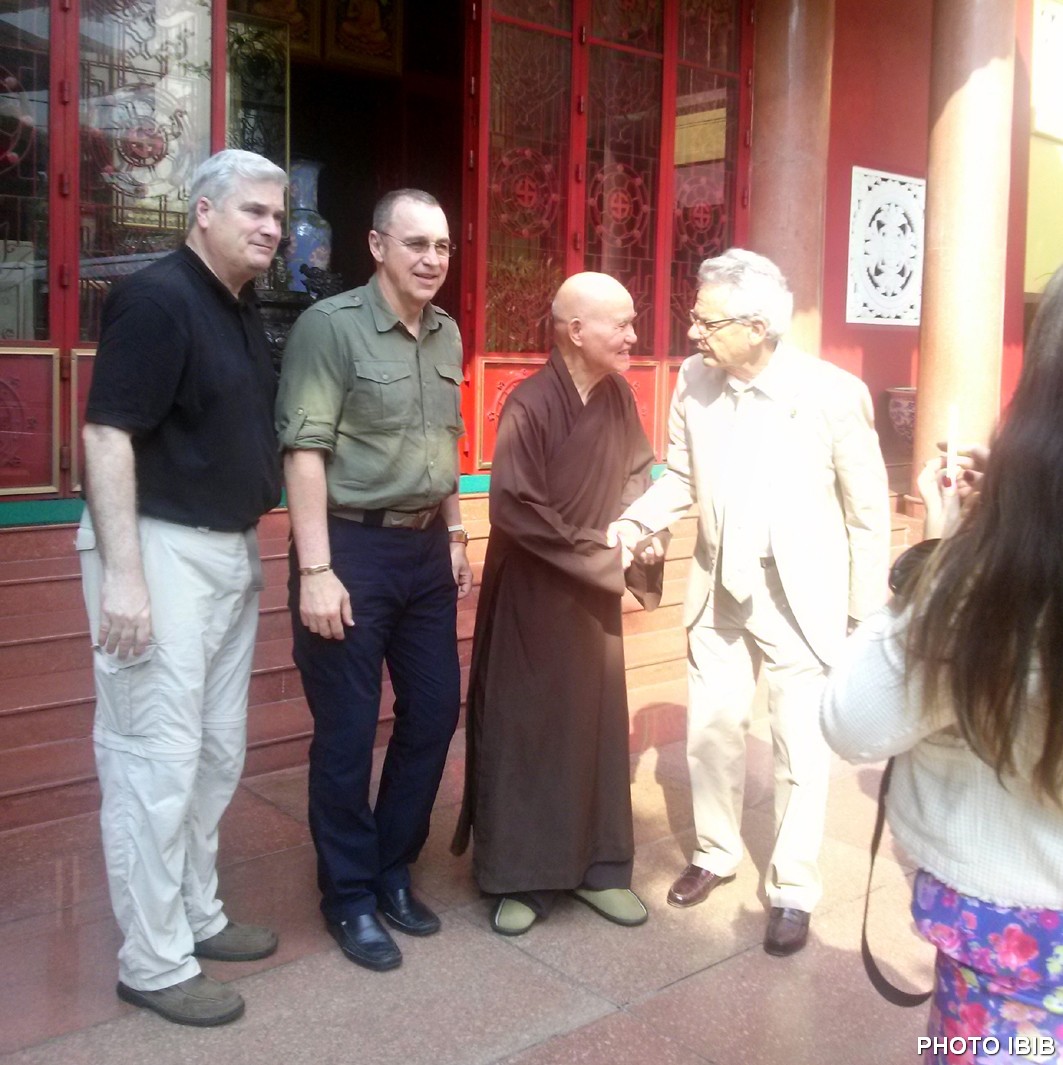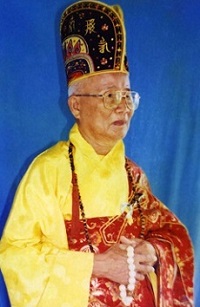“Religious freedom is the key to democratization in Vietnam” – Thich Quang Do
PARIS, 7 May 2015 (VCHR) – On Monday 4th May, a delegation of members of the U.S. Congress visited Thich Quang Do, prominent dissident and Patriarch of the outlawed Unified Buddhist Church of Vietnam (UBCV) at the Thanh Minh Zen Monastery in Saigon (Ho Chi Minh City) where he has been held under house arrest without charge since 2003.
The 11-member delegation was led by Congressman Matt Salmon (Republican), Chairman of the Asia Pacific Sub-Committee of the Foreign Affairs Committee of the House of Representatives (HFAC), Congressman Tom Emmer (Republican) and Congressman Alan Lowenthal (Democrat). They were accompanied by Mr Charles Sellers, Political Section Chief of the U.S. Consulate General in Ho Chi Minh City and a number of staff and assistants.

The US delegation outside Thanh Minh Zen Monastery – From left to right: Rep. Tom Emmer, Rep. Matt Salmon, Venerable Thich Quang Do and Rep. Alan Lowenthal
In his remarks to the U.S. delegation, Thich Quang Do, 87, who has spent the past three decades in internal exile, prison and house arrest for his advocacy of religious freedom, democracy and human rights, welcomed their visit: “For someone like me who has spent so many years in detention, your visit has a very deep significance. It not only comforts me to know that I am not forgotten, but it also sends a very strong message to the Vietnamese authorities. They have kept me under house arrest, isolated and deprived of all basic freedoms, in the aim of silencing my voice. Your visit here today tells them clearly that they have failed”.
Commenting on U.S.-Vietnam relations, which were normalized just 20 years ago, Thich Quang Do noted that, 40 years after the end of the Vietnam War, these relations remained complex. “They hold great opportunities but also many challenges”, he said. However, the UBCV Patriarch expressed his firm belief that “this is a crucial moment in our two countries’ relationship, one where the United States can truly make a difference.
“Asia is a central focus of U.S. foreign policy. As Vietnam seeks to play a greater role on the regional and international stage, it needs the support of the United States and the Trans-Pacific Partnership (TPP) to boost its slowing economy. The Communist leadership hopes it can do this without making political reforms – they claim they are “building democracy within the one-Party state”. But this policy of economic liberalization without political reforms is disastrous, resulting in alarming social inequalities and wealth disparity. Without democracy, pluralism and human rights, we can never build a just, safe and peaceful society for Vietnam.
“I believe that the United States has real leverage to help put Vietnam on the path of reform. By maintaining human rights as a cornerstone of U.S. engagement, you can impress upon the Vietnamese leadership that they cannot enjoy full economic relationships whilst suppressing their citizens’ basic rights”, he told the delegation.
The Buddhist Patriarch stressed the importance of religious freedom in Vietnam, not only as a basic human right, but also as “the key to democratization in Vietnam”. He applauded the report issued by the U.S. Commission on International Religious Freedom (USCIRF) last week, and their recommendation that Vietnam be designated as a “Country of Particular Concern” by the United States for egregious violations of religious freedom.
“I believe that United States’ support for religious freedom in Vietnam in general, and for Buddhism in particular, can have a deep and lasting impact in our region. In this era of global terrorism, where religious extremism is at the core of so many conflicts, the presence of a peaceful, tolerant philosophy such as Buddhism can contribute immensely to maintaining stability and harmony in the Asia-Pacific region”.
Thich Quang Do introduced the delegation to Le Cong Cau, leader of the UBCV-affiliated Budddhist Youth Movement and UBCV Secretary-general, who had come from Hue to join the meeting. Le Cong Cau gave a brief overview of three phases of government repression against the UBCV over the past 40 years. Beginning in 1975 with a brutal suppression campaign against the UBCV and the detention and murder of many UBCV leaders, Vietnam then sought to bring Buddhism under state control by setting up the State-sponsored “Vietnam Buddhist Sangha” in 1981 to supplant the UBCV. The third and current phase of repression, explained Le Cong Cau, entails a more subtle and sophisticated policy of infiltrating the UBCV in order to “divide to rule” and isolating UBCV leaders, whilst using Police intimidation to create a pervasive climate of fear, threatening Buddhists with losing their jobs or having their children expelled from school if they follow the UBCV.
The U.S. delegation asked Le Cong Cau for the UBCV’s opinion on the draft “Law on Belief and Religion” currently circulated by the Government Board of Religious Affairs to canvass the opinion of religious groups. He replied: “This new draft law brings no improvements. The Vietnamese authorities are hostile to religions. They recognize that religion abd belief are inevitable components of the people’s psyche, but they are afraid that religious movements could challenge the Communist Party’s authority. The current regime will never allow true religious freedom in Vietnam”.
Congressman Alan Lowenthal told Thich Quang Do that he represented the largest Vietnamese community outside Vietnam, that of Little Saigon, California. He said he was very moved to meet the UBCV Patriarch, whom he said was internationally renowned for his role in the movement for human rights and freedom in Vietnam. Congressman Lowenthal promised to inform public opinion about the situation of Thich Quang Do and the movement for freedom and democracy in Vietnam.
Thich Quang Do handed the U.S. delegation an 8-page Memorandum entitled “40 years of Repression against the Unified Buddhist Church of Vietnam”.—





0 Comments
You can be the first one to leave a comment.